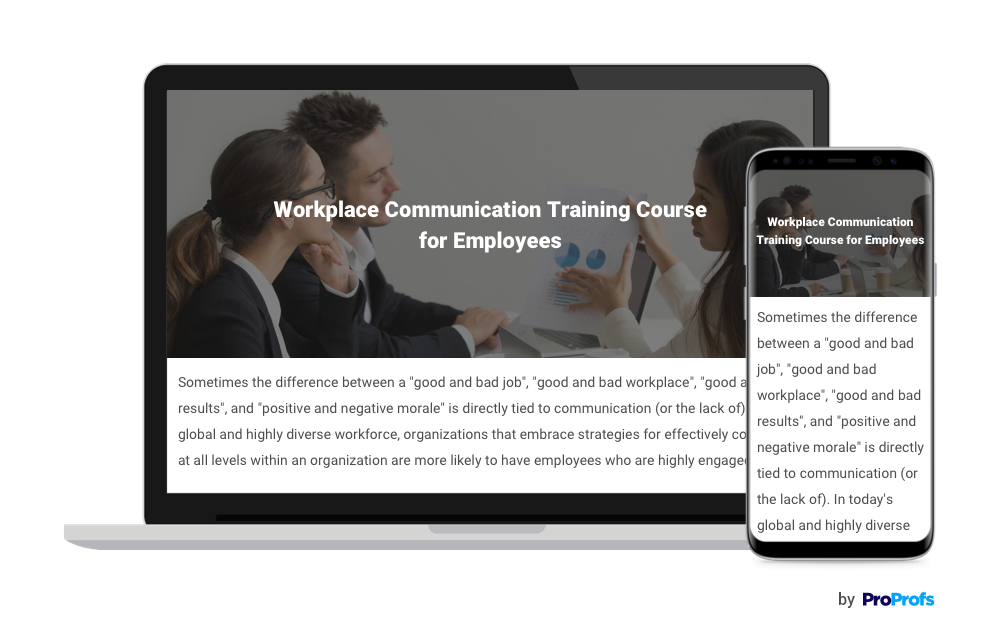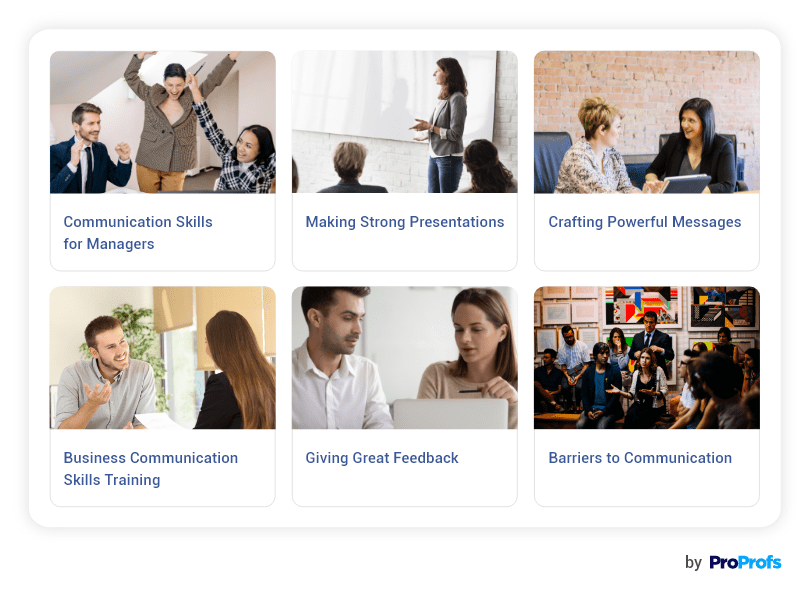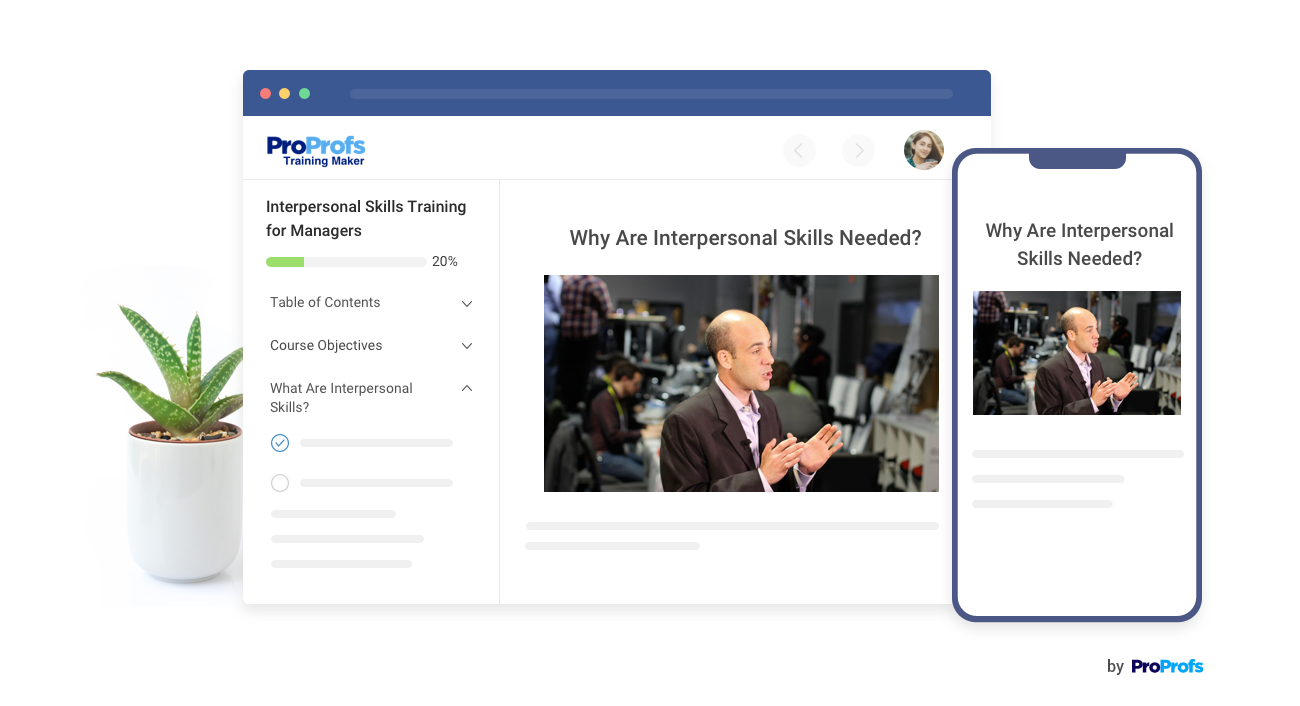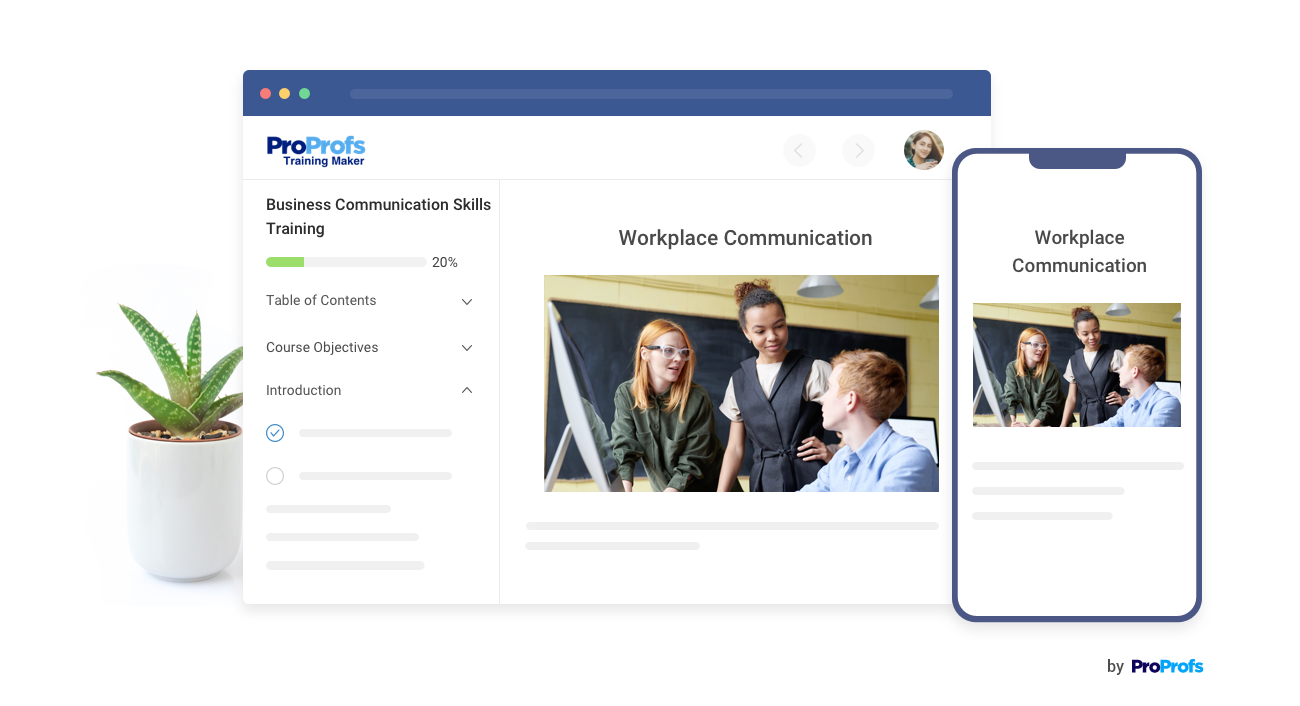Are you searching for the most effective communication skills training courses?
Having worked in the training industry for years, I’ve observed many communication challenges in the workplace.
From misunderstandings that lead to project delays to missed opportunities due to lack of clarity, the impact of ineffective communication can be devastating.
That’s why I strongly believe in the power of communication training courses.
In this blog post, I share some of the best communication courses for employees that I’ve come across in my career. Stay tuned!
What Is Communication Skills Training?
Communication skills training is a professional development program focusing on improving an individual’s ability to communicate effectively.
It encompasses a wide range of skills, including but not limited to:
- Verbal communication: This involves the words we choose, how we say them, our tone of voice, and even our pauses at times.
- Non-verbal communication: This includes facial expressions, body language, and gestures that can often speak louder than words.
- Listening skills: Effective communication isn’t just about getting your message across; it’s also about understanding others’ viewpoints.
- Written communication: This covers emails, reports, and other types of written correspondence in a professional setting.
- Presentation skills: It mainly covers public speaking and presenting ideas effectively to a group.
- Negotiation skills: These skills involve reaching a mutual agreement through effective dialogue and persuasion.
This training is beneficial for everyone, from entry-level employees to top-level executives. The ultimate goal of communication training for employees is to create a more productive, collaborative, and harmonious work environment.
9 Best Communication Skills Training Courses
These effective communication skills training courses cover in-demand topics. I’ve personally taken these courses and they really worked.
- Workplace Communication Skills
- Communication Skills for Managers
- Business Communication Skills
- Active Listening Skills
- Overcoming Communication Barriers
- Interpersonal Skills Training
- Conflict Resolution
- Online Customer Service Training
- Crafting Powerful Messages
1. Workplace Communication Skills

Effective communication is the lubricant that ensures the workplace functions smoothly.
It fosters collaboration, builds trust, and drives productivity.
But let’s face it: effective communication doesn’t always come naturally.
That’s where the Workplace Communication Skills course comes in.
This course is for everyone, from seasoned professionals seeking to refine their skills to new employees eager to make a solid first impression.
Here’s why it’s worth your time:
- Master the art of organizational communication: Learn to navigate the hierarchy, deliver your message clearly, and become a trusted voice within the company.
- Feedback becomes a breeze: Discover how to give and receive feedback constructively, turning criticism into a tool for growth.
- Communicate up, down, and across: Whether you’re interacting with your manager, colleagues, or clients, learn to tailor your communication style for each situation.
- Practice makes perfect: Put your newfound communication skills into action with real-world scenarios and interactive exercises.
2. Communication Skills for Managers
Are you struggling to motivate your team, delegate tasks, or handle conflict?
You’re not alone!
Successful leadership relies on effective communication, a skill many managers desire to master.
The Communication Skills for Managers course is designed to assist managers in cultivating the necessary abilities for success.
This course covers several topics, including:
- Identifying communication barriers
- Mastering different communication methods
- Creating a communication plan
- Giving and receiving feedback
- Dealing with difficult conversations
The course also includes worksheets, scenarios, and a final assessment to help managers apply what they have learned.
By taking this course, managers can learn how to:
- Communicate effectively with their teams
- Delegate tasks
- Resolve conflict
- Build stronger relationships with their team members
- Become more effective leaders
3. Business Communication Skills

This course is designed to help you develop practical business communication skills using various workplace scenarios. It suits anyone who wants to improve their business communication skills and achieve their goals.
The course is online and self-paced, so employees can learn easily and quickly.
You will learn how to engage in persuasive conversations and accomplish tasks quickly.
The course covers the following topics:
- Identifying and overcoming common communication barriers
- Mastering different communication methods and choosing the best one for each situation
- Communicating with clarity, confidence, and professionalism
- Using active listening and questioning techniques to understand others better
- Handling difficult conversations and conflicts with tact and diplomacy
- Using worksheets and scenarios to practice and apply the learned skills
The course is taught by Amber Rose, a program manager and coordinator with years of experience in various industries.
4. Active Listening Skills
Ever feel like you’re just talking past each other? Maybe you’re not listening to what the other person is saying. That’s where active listening comes in!
Active listening is like a superpower for communication. It helps you understand what someone is saying, build stronger relationships, and avoid misunderstandings.
I know what you’re thinking: “Ugh, another course?” But trust me, this one’s different. It’s not about dry lectures and boring exercises.
You’ll learn:
- How to listen: No more zoning out! Discover techniques to focus on the speaker and absorb their message.
- Overcoming barriers: Identify what’s blocking effective listening and learn how to overcome them.
- Powerful listening techniques: Put your newfound skills into action with practical tips for different situations.
- Giving feedback that sticks: Learn how to provide constructive feedback that helps people improve.
- The magic of open-ended questions: Unlock deeper conversations and encourage genuine expressions.
- Body language that speaks volumes: Discover how your non-verbal cues can impact communication.
5. Overcoming Communication Barriers
The path to effective communication is often hindered by barriers.
There are four main types of communication barriers:
- Semantic barriers: These are related to the meaning and interpretation of words and symbols. People may have different definitions, connotations, or associations with the same word or symbol. For example, the word “red” may mean different things to different people, such as a color, a political ideology, a warning sign, or a mood.
- Psychological barriers are the mental and emotional state of the sender or receiver. Psychological factors affecting communication are stress, anxiety, fear, anger, prejudice, bias, stereotyping, or lack of confidence.
- Physical barriers: Some physical factors hindering communication are noise, distance, time, weather, or technical problems.
- Cultural barriers: These are related to the differences in values, beliefs, norms, or customs among different groups. Cultural barriers can also arise from using different languages, dialects, or accents that may cause confusion or miscommunication.
If you want to improve your communication skills and overcome these barriers, I would recommend this communication skills training topic: “Overcoming Communication Barriers.”
It will help you identify the common communication barriers, understand their causes and effects, and learn how to overcome them. You will learn how to communicate with different types of people, such as customers, colleagues, managers, or friends.
6. Interpersonal Skills Training

Interpersonal skills are vital for success in any workplace. They enable you to communicate effectively, build rapport, and handle conflicts with others.
However, interpersonal skills can be learned and improved through training and practice.
This course by ProProfs Training Maker will equip you with the knowledge and skills you need to interact successfully with others in any situation.
You will learn how to:
- Analyze your and others’ personality types, communication styles, and emotional intelligence, and use this information to improve your communication and relationship skills
- Apply verbal and non-verbal techniques, active listening, and feedback skills to communicate clearly and confidently with anyone
- Use rapport-building strategies, empathy, and trust to build positive and lasting relationships with your manager, colleagues, clients, and stakeholders
- Apply assertiveness, negotiation, and problem-solving skills to manage and resolve conflicts effectively and constructively
- Understand team roles, dynamics, and collaboration tools to work effectively in teams and achieve team goals.
The best part?
You can access engaging and interactive content, including videos, quizzes, and case studies.
7. Conflict Resolution
Have you ever become entangled in a workplace conflict? It can be a stressful and unpleasant experience, leaving you feeling frustrated and unproductive.
But did you know that these conflicts, if unchecked, can have serious consequences for your professional relationships and your company’s bottom line?
That’s why a conflict resolution mechanism is vital. It’s not just about resolving disputes but also about preventing them from happening in the first place.
Think of it like nipping a problem in the bud before it can blossom into a full-blown crisis.
ProProfs’ Conflict Resolution Training Course is designed to do just that. It equips participants with the skills and knowledge to resolve conflicts effectively, fostering a positive work environment.
This communication skills training course can empower you with the skills and strategies to:
- Identify and address conflicts before they get out of hand
- Master various communication methods to effectively resolve disputes
- Choose the right communication approach for different situations
- Recognize when third-party intervention is necessary
The course follows a clear and concise format, making it easy to follow and understand.
You’ll learn real-world strategies to apply to your workplace conflicts immediately.
8. Online Customer Service Training
Ever wonder why customer service skills are a part of communication training? It’s not just for dealing with customers, it’s for thriving in any workplace interaction.
This course will teach you everything you need to know about:
- Delivering exceptional customer service: Exceed expectations and leave a lasting positive impression.
- Building rapport: Master verbal and non-verbal communication techniques to connect with anyone.
- Handling difficult situations: Learn to de-escalate conflict and find win-win solutions.
- Active listening: Understand customer needs and provide solutions that truly address them.
- Problem-solving and decision-making: Approach challenges strategically and make informed choices.
- Using customer service tools and software: Streamline your workflow and manage customer interactions effectively.
You can also refer to this course to understand how to write the best customer service emails.
9. Crafting Powerful Messages
Whether you’re writing an email, preparing a presentation, or simply having a conversation, knowing how to convey your message effectively can make all the difference.
This comprehensive course, “Crafting Powerful Messages,” will help you master the art of verbal and written communication.
Led by the expert Kristen Bagwill, CEO of COMM-Unity, this course takes you through understanding your audience, constructing impactful messages, and delivering them with clarity and confidence.
Here’s what you’ll learn:
- Audience awareness: Understand your audience’s needs and expectations to tailor your message for maximum impact.
- Message construction: Learn how to structure your message clearly and concisely, ensuring your key points shine through.
- Delivery with impact: Whether speaking or writing, discover techniques to captivate your audience and leave a lasting impression.
- Simple and purposeful: Focus on communicating clearly and avoid unnecessary jargons.
- Building relationships: Foster stronger connections through respectful and empathetic communication.
- Universal principles: Apply the course’s fundamental principles to all forms of communication, from emails and texts to presentations and reports.
This valuable course can be your key to mastering communication and achieving success in all areas of life.
Why Is Communication Skills Training Important?
Communication skills training for employees is important for many reasons. Here are some benefits of improving your communication skills:
- Increases Productivity and Efficiency
- Improves Engagement and Satisfaction
- Builds Lasting Relations
- Facilitates Career Growth and Development
- Enriches Personal and Social Life
1. Increases Productivity and Efficiency
Communication skills training can help you convey your ideas, listen actively, and collaborate effectively.
This can reduce misunderstandings, errors, and conflicts and increase the quality and speed of your work.
For example, one study found that teams who communicate effectively may increase their productivity by as much as 25%.
2. Improves Engagement and Satisfaction
A survey found that 81% of employees who feel valued at work are highly engaged, compared to only 4% of those who do not feel valued.
Communication training empowers you to express your opinions, needs, and emotions in a way that gets noticed and appreciated.
This leads to greater engagement, recognition, and a sense of belonging, boosting your mood and satisfaction by leaps and bounds.
3. Builds Lasting Relations
Employee communication training helps you build trust, rapport, and loyalty with your colleagues, managers, and clients.
This can foster a supportive work environment and reduce the likelihood of turnover and attrition.
4. Facilitates Career Growth and Development
Communication skills are the golden thread woven into every career path. They are the key to unlocking doors to opportunity and achieving professional goals.
Therefore, communication training can help you to demonstrate your competence, confidence, and professionalism in your work.
This can enhance your reputation, credibility, and influence in your field and open up new opportunities for advancement and learning.
5. Enriches Personal and Social Life
Communication isn’t just about work; it’s the lifeblood of all your relationships.
Employee communication training is instrumental in enhancing your ability to communicate professionally and effectively with others, emphasizing appropriate language, tone, and etiquette.
This training not only contributes to the advancement of your career by honing presentation, negotiation, and persuasion skills but also aids in stress and emotion management, equipping you with the tools to navigate difficult situations, feedback, and criticism.
Such training fosters a balanced approach to work and life, encouraging the establishment of boundaries, task prioritization, and effective delegation of responsibilities.
Improve Workplace Communication Effortlessly
Enhance collaboration and productivity with better communication skills.
How to Improve Communication Skills Training for Employees
Perhaps you already have a communication training program in place in your organization.
But if you’re not getting the expected ROI from it, you may need an improvement plan.
Here are some tips on how to improve communication training for your employees.
1. Tailor the Training to Your Needs
- Identify your target audience. Are you training your managers, customer service representatives, or a general group of employees? Customize the content and delivery style to their specific needs and roles.
- Analyze existing communication gaps. What are the common communication challenges your employees face? Focus the training on addressing those specific issues. Here’s a guide on How to Conduct an Effective Skills Gap Analysis
- Use a mix of learning methods. Combine traditional classroom sessions with interactive activities, role-playing exercises, and online learning modules to cater to different learning styles. A blended learning software can help deliver a rich learning experience.
Fun Activity: What do you know about blended learning? Take this quiz to check your knowledge!
2. Focus on Key Communication Skills

Focusing on key communication skills during workplace communication training for employees is crucial. This is because these skills are often linked to other professional areas, such as collaboration and teamwork, leadership development, and customer satisfaction.
You may focus on the following skills:
- Active listening: Teach employees to pay attention, ask questions, and repeat information to ensure they understand.
- Clear and concise communication: Emphasize the importance of using plain language, avoiding jargons, and structuring messages logically.
- Non-verbal communication: Teach employees about the power of eye contact, body language, and tone of voice.
- Giving and receiving feedback: Train employees to give helpful feedback in a considerate way and receive feedback without being defensive.
- Conflict resolution: Help your employees learn how to identify and address conflicts constructively.
3. Use the Right LMS Software
Your training programs stand a chance of success when you use the right training tool.
You may consider deploying a learning management system (LMS) such as ProProfs Training Maker. It can assist you in creating, managing, delivering, tracking, and analyzing online courses and assessments.
- Develop online courses and modules with multimedia content, including videos, simulations, and interactive scenarios.
- Create interactive quizzes and assessments to measure comprehension and retention.
- Collect feedback and track progress to measure the impact of your training program and make adjustments as needed.
4. Encourage Continuous Learning
- Provide ongoing opportunities for practice and reinforcement. This could include regular workshops, online forums for discussion, and coaching programs.
- Promote knowledge sharing where employees exchange their learning experiences and best practices with one another.
- Create a culture of feedback and open communication. Encourage employees to give and receive feedback constructively to improve their communication skills continuously.
5. Measure the Results
- Track key performance indicators (KPIs) such as employee engagement, productivity, and customer satisfaction.
- Conduct surveys to gather feedback on the effectiveness of your training programs.
Get These Employee Survey Templates - Analyze data to identify improvement areas and adjust your training strategy.
By implementing these best practices, you can drastically improve your communication training programs and start getting better results.
Don’t Just Read! Deploy Communication Training Courses
By now, you must have understood what communication skills training entails and how it can benefit individuals and organizations.
Remember, the more we invest in developing our communication skills, the more empowered we become to navigate any situation confidently and gracefully.
So, let’s not let this knowledge gather dust!
Take what you’ve learned from here and put it into practice.
Investing in yourself and your employees unlocks a world of possibilities, fostering stronger relationships, boosting productivity, and ultimately achieving success in all aspects of your life and work.
Get Free Employee Training Software — All Features, Forever.
We've helped 567 companies train 200,000+ employees. Create courses in under a minute with our AI LMS or use 200+ ready-made courses on compliance, harassment, DEI, onboarding, and more!
Frequently Asked Questions
How can I measure the effectiveness of communication training?
Assess improvements in team collaboration and track clearer messaging. Monitoring increased employee engagement and reduced misunderstandings also indicates success. Regular assessments and real-life application of learned skills help gauge the overall impact of communication training programs.
Can communication training be customized to address specific workplace challenges?
Yes, communication training can be tailored to target specific workplace challenges. Customization involves identifying and addressing issues unique to the organization, such as team conflicts or unclear directives. By tailoring content and exercises, training programs can effectively tackle the specific communication needs and hurdles a workplace might face.
What is the duration of the training sessions?
Training sessions vary but are typically a few hours to a day. It depends on the specific training goals, content complexity, and organizational preferences. Shorter sessions may be more frequent, while longer ones might be held less frequently to accommodate schedules and maximize learning retention.
How often should communication skills training be done?
Communication skills training should be done regularly to ensure continuous improvement. Monthly or quarterly sessions can help reinforce key concepts and allow participants to practice and apply their skills in real-life scenarios. Consistent training fosters long-term development, helping individuals build and maintain effective communication habits in personal and professional settings.
 Tips
Tips
We’d love to hear your tips & suggestions on this article!
Get Free Employee Training Software — All Features, Forever.
We've helped 567 companies train 200,000+ employees. Create courses in under a minute with our AI LMS or use 200+ ready-made courses on compliance, harassment, DEI, onboarding, and more!

 We'd love your feedback!
We'd love your feedback! Thanks for your feedback!
Thanks for your feedback!







